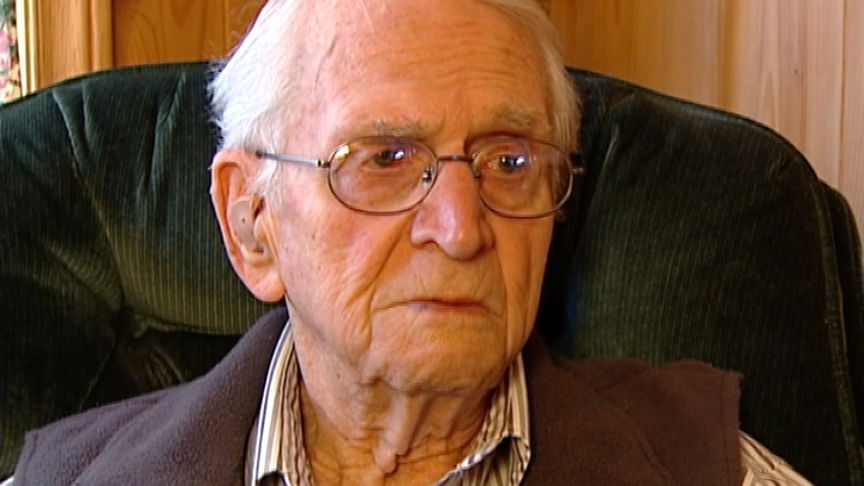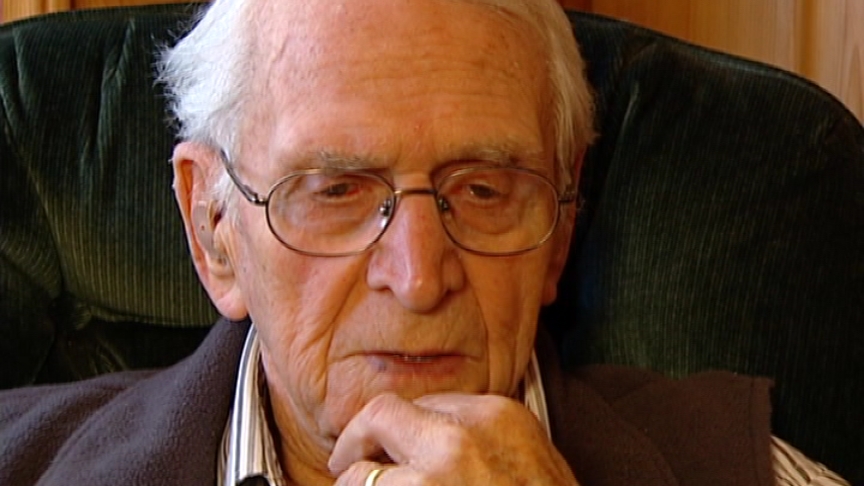Taking Enemy Fire
Heroes Remember
Taking Enemy Fire
Transcript
Trail of smoke from a damaged airplane.
explode either above you or below you. I remember one night, one, one shell exploded, well it wasn't too darn far from us because you could feel the jolt of it in the air craft. But we came through it alright. Oh there was usually a hole or two in the air craft. I know one night . . . that could be one of the nights we flew to Italy. But anyway there was a shell, shell went through just ahead of the tail gunner, missed him about that far. The hole would be probably that big. Now how the hell it ever missed the ailerons I don't know. But they're up here, I don't know how many came up here and the centre... they're through the centre. Now the shell came up through here I guess the hole would be probably that big where it went in and same where it came out. We didn't know until the next morning. Or maybe the rear gunner knew when he came out, I don't remember. But it was a good sized hole.Description
Mr. MacWilliam tells us of a bombing run over enemy territory where they fired tracer bullets at them from anti aircraft batteries and feeling flack shells exploding around him. He also describes his aircraft being hit by an exploding shell that some how passed through the plane without injuring or killing any of the crew.
Wilbur Carmen (Mick) MacWilliam
Mr. MacWilliam was born August 16, 1918, on a farm in Cape Wolfe, Prince Edward Island. He had four other siblings, three brothers and one sister. He attended school in a one room school house until the age of 18. During the depression the family managed as they were pretty self sufficient on the farm. Mr. MacWilliam left the farm and went to Montreal where he lived with his brother for nine months before the war. He enlisted in the Canadian Air Force in Charlottetown as a radio operator and was sent by train to Brandon, Manitoba, for basic training. From there he went to the 10th repair depot in Calgary, Alberta, where he performed guard duties and then on to Winnipeg for wireless training. Mr. MacWilliam then travelled north of Portage La Prairie to receive training as an air gunner. When his training was complete he was sent home to PEI for leave before being called to Montreal and told he would be shipped to Bermuda to serve on a Catalina flying boat for training. From Bermuda Mr. MacWilliam was sent to England, arriving in Bournemouth, and was assigned to a bombing crew where he carried out his position of wireless operator and gunner. He served on 29 missions and although he had many close calls he was never shot down. In 1943, at the end of his missions he returned to Canada, aboard the Mauritania, for pilot training, with the intention of returning for another tour. Instead he finished up his service as an instructor at the Mount Pleasant bombing and gunnery school air base in Prince Edward Island. After the war he worked at CJCH in Halifax before joining CBC Radio international as a technician.
Meta Data
- Medium:
- Video
- Owner:
- Veterans Affairs Canada
- Duration:
- 2:19
- Person Interviewed:
- Wilbur Carmen (Mick) MacWilliam
- War, Conflict or Mission:
- Second World War
- Location/Theatre:
- France
- Branch:
- Air Force
- Occupation:
- Wireless Operator/ Gunner
Related Videos
- Date modified:




